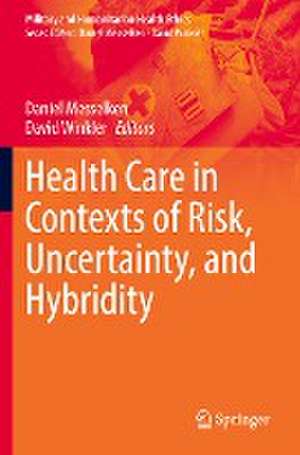Health Care in Contexts of Risk, Uncertainty, and Hybridity: Military and Humanitarian Health Ethics
Editat de Daniel Messelken, David Winkleren Limba Engleză Paperback – 25 noi 2022
| Toate formatele și edițiile | Preț | Express |
|---|---|---|
| Paperback (1) | 733.19 lei 38-44 zile | |
| Springer International Publishing – 25 noi 2022 | 733.19 lei 38-44 zile | |
| Hardback (1) | 744.33 lei 38-44 zile | |
| Springer International Publishing – 24 noi 2021 | 744.33 lei 38-44 zile |
Preț: 733.19 lei
Preț vechi: 964.73 lei
-24% Nou
Puncte Express: 1100
Preț estimativ în valută:
140.31€ • 152.36$ • 117.86£
140.31€ • 152.36$ • 117.86£
Carte tipărită la comandă
Livrare economică 19-25 aprilie
Preluare comenzi: 021 569.72.76
Specificații
ISBN-13: 9783030804459
ISBN-10: 3030804453
Pagini: 280
Ilustrații: VII, 280 p. 4 illus., 1 illus. in color.
Dimensiuni: 155 x 235 mm
Ediția:1st ed. 2022
Editura: Springer International Publishing
Colecția Springer
Seria Military and Humanitarian Health Ethics
Locul publicării:Cham, Switzerland
ISBN-10: 3030804453
Pagini: 280
Ilustrații: VII, 280 p. 4 illus., 1 illus. in color.
Dimensiuni: 155 x 235 mm
Ediția:1st ed. 2022
Editura: Springer International Publishing
Colecția Springer
Seria Military and Humanitarian Health Ethics
Locul publicării:Cham, Switzerland
Cuprins
Chapter 1. Health Care in Contexts of Risk, Uncertainty, and Hybridity – Introduction to the Volume (Daniel Messelken & David T. Winkler).- Part 1: Doctrinal and legal aspects.- Chapter 2. Military Medical Ethics & the United States: An Overview of Recent Developments in the Operationalized Landscape (Sheena Eagan).- Chapter 3. Attacks on hospitals: an alarming problem for military medicine as well as for humanitarian medicine (Philippe Calain).- Chapter 4. Impact of US anti-terrorism legislation on the obligation of non-state armed groups to provide medical care to the wounded and sick under IHL (Audrey Palama).- Chapter 5. Military Medical Staff in Hybrid Wars (Paul Gilbert).- Part 2: Treating soldiers.- Chapter 6. Morituri soldiers on operation theatres: the French approach and a case analysis (Gwion Loarer & Julien Viant).- Chapter 7. Patient Preference Predictors and Paternalism in Military Medicine (Nathaniel Sharadin).- Chapter 8. Battlefield Euthanasia: Ethics and the Law (David L. Perry).- Part 3: Treating civilians and humanitarian missions.- Chapter 9. The Ethical Challenges of Providing Medical Care to Civilians during Armed Conflict (Michael L. Gross).- Chapter 10. Bridging the Gap between Intentions and Outcomes in Military Humanitarian Assistance and Disaster Relief missions (Joanne Clifford).- Chapter 11. Rescuing Relief in Remote Management and Programming: Using a Duty of Care Transfer Review to Assess the Accountability of Humanitarian Interventions (Ali Okhowat & Caroline Clarinval).- Chapter 12. Unpacking the “oughtness” of palliative care in humanitarian crises: moral logics and what is at stake? (Elysee Nouvet et al).- Chapter 13. Risk and infectious disease outbreaks: should military medical personnel be willing to accept greater risks than civilian medical workers? (Heather Draper).- Part 4: Doing research.- Chapter 14. When to Suspend Bioethical Principles in Military Medicine for Operational Purposes: a Framework Approach (Nikki Coleman).- Chapter 15. The Ethics of Biomedical Military Research: Therapy, Prevention, Enhancement, and Risk (Alexandre Erler & Vincent Müller).- Chapter 16. Military medicine research: Incorporation of high risk of irreversible harms into a stratified risk framework for clinical trials (Alexander Harris & Frédéric Gilbert).- Index.
Notă biografică
Daniel Messelken is a research associate at the Center for Ethics at Zurich University and leader of the Zurich Center for Military Medical Ethics (www.cmme.uzh.ch). He also serves as Head Ethics Teacher for the Center of Reference for Education on IHL and Ethics of the International Committee of Military Medicine and is member of the Board of Directors of the International Society for Military Ethics in Europe (EuroISME). Dr. Messelken studied Philosophy and Political Science in Leipzig and Paris (1998-2004) and received his PhD in philosophy from the University of Leipzig in 2010. Besides Military Medical Ethics, his main research fields include Just War Theory, the Morality of Violence, Military Ethics, and Applied Ethics more generally.
David Winkler is director of the Center of Reference for Education on International Humanitarian Law and Ethics of the International Committee of Military Medicine (www.cimm-icmm.com). He is a medical doctor specializing in neurology andholds a Ph.D. in neurobiology. Lieutenant Colonel Winkler is a staff officer in the Swiss Armed Forces Medical Services Directorate. He conducts clinical and academic work at the Cantonal Hospital Baselland, and the University Hospital Basel, Switzerland.
David Winkler is director of the Center of Reference for Education on International Humanitarian Law and Ethics of the International Committee of Military Medicine (www.cimm-icmm.com). He is a medical doctor specializing in neurology andholds a Ph.D. in neurobiology. Lieutenant Colonel Winkler is a staff officer in the Swiss Armed Forces Medical Services Directorate. He conducts clinical and academic work at the Cantonal Hospital Baselland, and the University Hospital Basel, Switzerland.
Textul de pe ultima copertă
This book sheds light on various ethical challenges military and humanitarian health care personnel (HCP) face while working in adverse conditions. Contexts of armed conflict, hybrid wars or other forms of violence short of war, as well as natural disasters, all have in common that ordinary circumstances can no longer be taken for granted. Hence, the provision of health care has to adapt, for example, to a different level of risk, to scarce resources, or uncommon approaches due to external incentives or requirements. This affects the practice of health care as well as its ethics. This book offers a panoramic overview on various challenges healthcare faces in extraordinary situations and provides new insights from practitioners’ as well as from academic scholars’ perspectives.
Caracteristici
The first comprehensive introduction to healthcare ethics in the context of armed conflict Offers guidance to health care providers who work in extremely challenging situations Highly relevant for medical professionals from both military and humanitarian organisations



